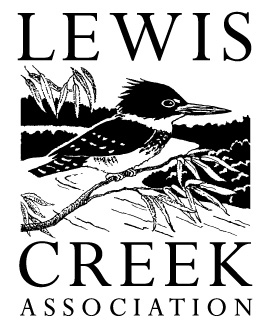Aquatic invasive plant species have been present in the Lewis Creek watershed for decades and outcompete native plants by forming dense mats of vegetation. These dense mats impede recreational boaters, swimmers, and anglers, and degrade ecosystems and wildlife habitats. Aquatic invasive plants are spread via seeds, roots, fragments, animals, and by humans.
Bristol Pond and Monkton Pond are popular destinations for anglers, recreational boaters, and wildlife enthusiasts. As of 2020, there were two known aquatic invasive species in Bristol Pond: European Frogbit (Hydrocharis morsus-ranae) and Eurasian Watermilfoil (Myriophyllum spicatum), and two aquatic invasive species in Monkton Pond: Eurasian Watermilfoil and Curly-leaf Pondweed (Potamogeton crispus). Therefore, Bristol Pond and Monkton Pond could function as points of introduction for the spread of aquatic invasive species in the Lewis Creek watershed and throughout the state. Lewis Creek Association (LCA), a local non-profit watershed group, recognizes the importance of keeping additional aquatic invasive species (AIS) out of Bristol Pond and Monkton Pond, as well as preventing the spread of AIS from Bristol Pond and Monkton Pond to other areas of the state.
To this end, LCA applied for and was awarded a grant from the Lake Champlain Basin Program, to continue its Boat Launch Steward Program at Bristol Pond and to establish a Boat Launch Steward Program at Monkton Pond. The boat launch stewards greet boaters as they arrive at the ponds and offer to inspect their boats for aquatic invasive species, while also collecting data on where the boat has been and how many aquatic organisms they encountered. They educate boat owners on how to prevent the spread of AIS, which includes cleaning, draining, and drying your boat (and other equipment that has been in the water!) before moving to a different water body. This could even include swimsuits and life jackets, which could carry small microscopic organisms like the fishhook waterflea, which was recently found in Lake Champlain.
During the summer of 2020, LCA’s boat launch stewards interacted with 570 watercraft and educated many more members of the community at Bristol Pond. While conducting their duties the boat launch stewards directly prevented at least 63 potential AIS infestations to other waterbodies and may have indirectly prevented hundreds of AIS infestations by educating the public.
Next time you are out at Bristol Pond or Monkton Pond, say hi to LCA’s boat launch stewards! They will gladly discuss any topics regarding AIS and show you how you can do your part in preventing the spread of AIS! You can learn more by contacting Kate Kelly, Program Manager for Lewis Creek Association, at lewiscreekorg@gmail.com or 488-5203.
This project has been funded wholly or in part by the United States Environmental Protection Agency under assistance agreement (LC00A00695) to NEIWPCC in partnership with the Lake Champlain Basin Program.

